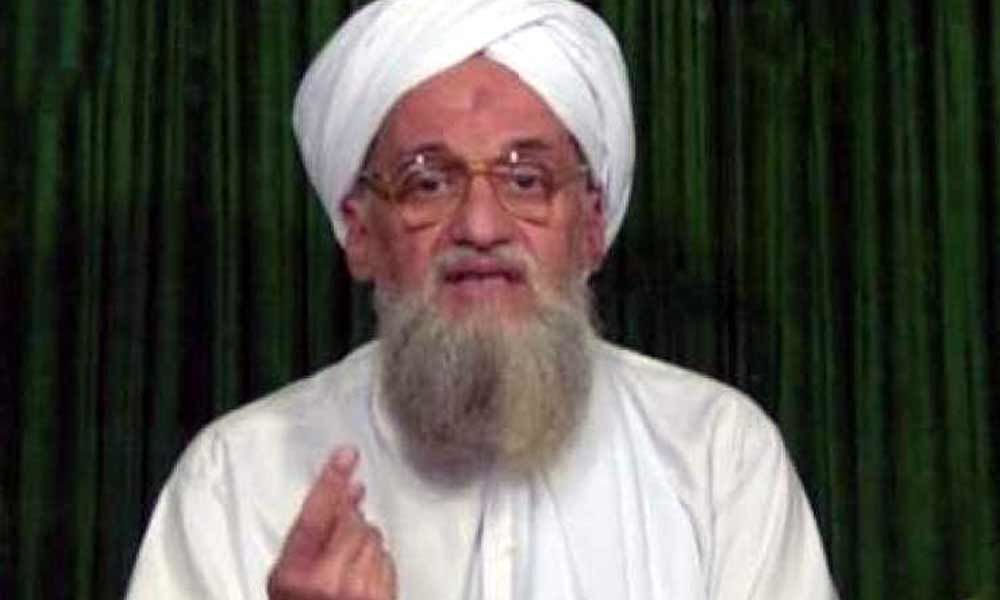Live
- Govt ready to pump funds into big ticket irrigation projects: Ministers
- NTR Vikasa job drive tomorrow
- Baldia boss pitches for speedy Prajavani complaint redressal
- Take decisions within stipulated time: Health Minister to officials
- Make This Holi Healthy and Special with California Almonds
- FGG wants CS to pause payment of Income Tax of CM, ministers
- MIT-WPU develops smart IoT-enabled dispenser for better medication management
- AP CRDA to meet today over Amaravati capital works
- Rise of female talent: Job opportunities surge by 48 pc
- Granite industry losing shine in Tadipatri
Just In
Al-Qaeda remains resilient, continues to cooperate closely with LeT: UN report


A UNSC report said that the ISIL is reported to be moving towards a hub-and-spoke network in its remote provinces, a logical extension of the dispersed, delegated leadership approach.
UNITED NATIONS: Al-Qaeda "remains resilient" and continues to cooperate closely with Pakistan-based terror outfits like Lashkar-e-Taiba (LeT) and the Haqqani Network, but the health of its leader Aiman Muhammed al-Zawahiri and how the succession will work are in doubt, according to a UN report.
This was revealed in the 24th report of the Analytical Support and Sanctions Monitoring Team that was submitted to the UN Security Council Al-Qaeda Sanctions Committee here this month.
The sanctions monitoring team submits independent reports every six months to the Security Council on the Islamic State, Al-Qaeda and associated individuals, groups, undertakings and entities. "Al-Qaeda remains resilient, although the health and longevity of its leader, Aiman Muhammed Rabi al-Zawahiri, and how the succession will work are in doubt," it said.
Al-Qaeda considers Afghanistan a continuing safe haven for its leadership, relying on its long-standing and strong relationship with the Taliban, it said.
Under Taliban patronage, Al-Qaeda is keen to strengthen its presence in Badakhshan Province, in particular in the Shighnan area bordering Tajikistan, as well as in Barmal, in Paktika Province, it added. "Al-Qaeda continues to cooperate closely with Lashkar-e-Taiba and the Haqqani Network. Al-Qaida members continue to function routinely as military and religious instructors for the Taliban," the report said.
It further noted that the Islamic State of Iraq and Levant (ISIL) is reported to be moving towards a hub-and-spoke network in its remote provinces, a logical extension of the dispersed, delegated leadership approach. "Better established affiliates are taking on elements of responsibility for lesser ones, channelling funds and assisting with propaganda. Over time, this may have the effect of regionalising the agendas of these networks," the report said.
This has already happened in the case of Al-Qaida, which has long embedded itself in local issues and politics, bringing the group some successes but also some problems, as in Idlib, it stated. Further, groups aligned with Al-Qaeda are stronger than their ISIL counterparts in Idlib, Syrian Arab Republic, Yemen, Somalia and much of West Africa.
The largest concentrations of active foreign terrorist fighters are in Idlib and Afghanistan, the majority of whom are aligned with Al-Qaeda.
The report, however, noted that ISIL remains much stronger than Al-Qaeda in terms of finances, media profile, current combat experience and terrorist expertise and remains the more immediate threat to global security. It also stressed that the ability of local authorities to cope with terrorist challenges in Afghanistan, Libya and Somalia remains limited.
Referring to the Easter Sunday attacks in Sri Lanka that killed 258 people, the report said that despite the claim of responsibility by ISIL, member state investigations revealed that the "ISIL core did not direct or facilitate the attacks, nor did it know about them in advance." "It was a locally instigated and led attack inspired by ISIL ideology. The bombings aimed to boost the global image of ISIL after its military defeat in Iraq and the Syrian Arab Republic," it said.
"Regional Member States expressed concern about dynamics in the region, in particular in Sri Lanka, southern India and the Maldives, that could contribute to internal threats. Since 2013, approximately 170 Maldivians have travelled to Iraq and the Syrian Arab Republic, and more than 70 have unsuccessfully attempted to travel," it said.
The report noted that as ISIL continues its evolution from a 'pseudo-state to a global network' inspiring and directing terrorism, it may aim to build platforms for operations in areas in which it has not been active before. "The Easter Sunday attacks may serve as a blueprint for future ISIL terrorism in other unexpected locations. The return of foreign terrorist fighters to their home countries from Iraq and the Syrian Arab Republic may combine with indigenous radicalization in South Asia or elsewhere," it said.
The report also mentioned that the Lanka attacks show the continuing appeal of ISIL propaganda and the risk that indigenous cells may incubate in unexpected locations and generate a significant terrorist capability. "These and other ISIL attacks on places of worship, alongside the attacks in Christchurch in New Zealand in March offer a troubling narrative of escalating interfaith conflict," it said.
The report also noted that outside the core conflict zone, ISIL and Al-Qaeda are both contending for dominance and international relevance. "Some Member States describe the existence of a number of local conflict zones, each of which has its own gravitational pull, drawing foreign terrorist fighters who either come from the region or have ethnic or linguistic ties to it," it said.
Afghanistan remains the most established of these, and concerns remain about the short and long-term threats posed by ISIL and Al-Qaeda-aligned groups and foreign terrorist fighters who have established themselves on Afghan territory, the report said.
There are also growing concerns about West Africa and the Sahel, where ISIL and Al-Qaeda are both active and deconflict with each other in favour of destabilizing the more fragile regional States.

© 2025 Hyderabad Media House Limited/The Hans India. All rights reserved. Powered by hocalwire.com






